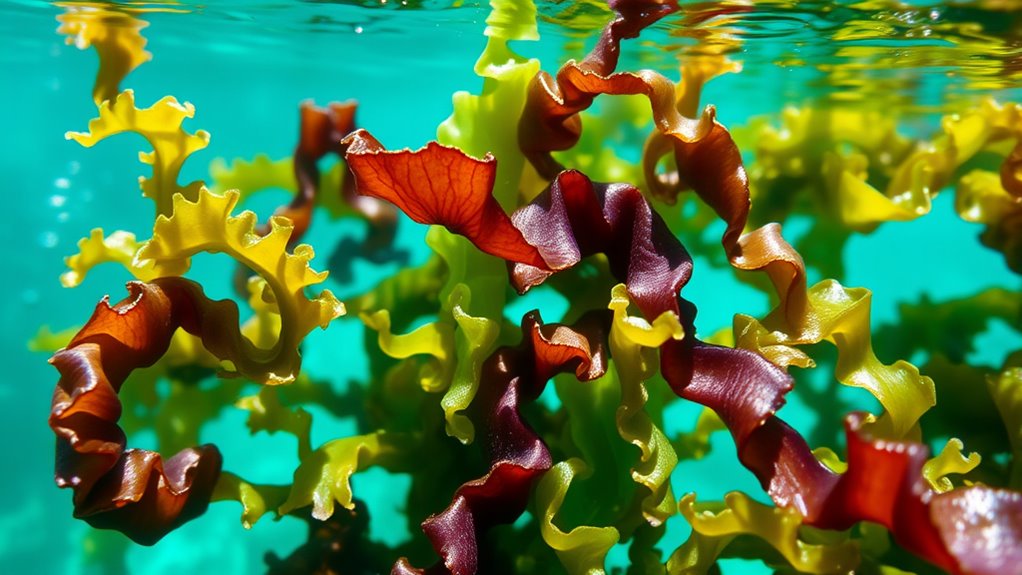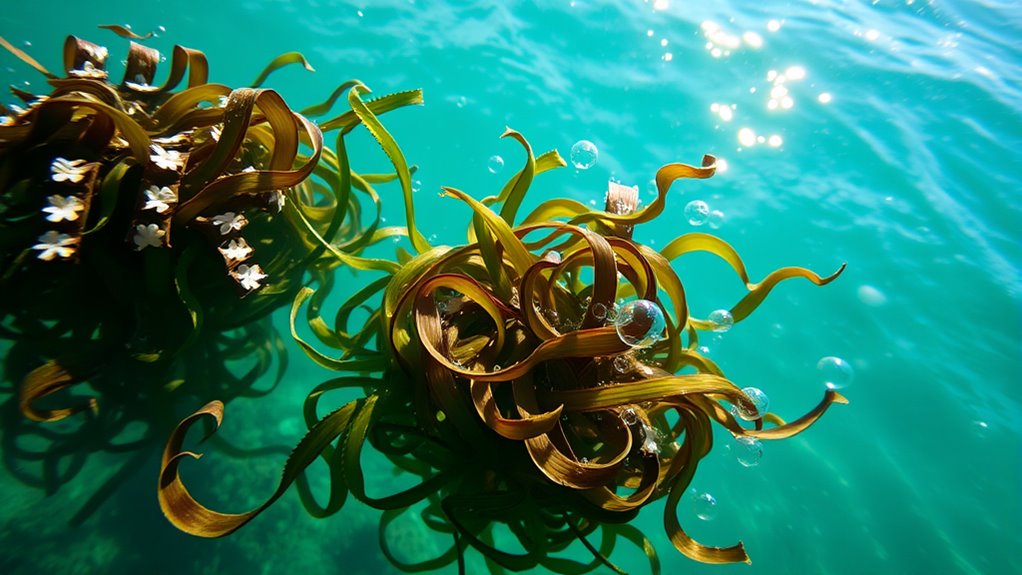If you spot seaweed floating nearby, it’s likely to be varieties like nori, wakame, or kelp, which are commonly used in cooking and snacks. These edible seaweeds are rich in vitamins, minerals, and antioxidants, offering a nutritious boost. They grow naturally in ocean waters and sometimes wash ashore after storms or tides. Continuing your exploration can reveal more about the health benefits and sustainable harvesting of these ocean treasures.
Key Takeaways
- Floating seaweed edible varieties include nori, kelp, and wakame, often seen near coastlines or washed ashore.
- These seaweeds are rich in essential nutrients like iodine, vitamins, and minerals, making them safe and healthy to consume.
- Seaweed floats naturally due to its buoyant structure and can accumulate in large mats or clusters in ocean currents.
- Harvested or stranded seaweed can sometimes be found washed up on beaches, ready for collection or consumption after proper cleaning.
- Always identify and source seaweed from clean, unpolluted waters to ensure safety before consumption.

Have you ever considered adding seaweed edibles to your diet? These marine plants are more than just ocean scenery; they’re a nutritious, sustainable food source that’s gaining popularity worldwide. When you incorporate seaweed into your meals, you’re tapping into a superfood rich in vitamins, minerals, and antioxidants. Many varieties, like nori, kelp, and wakame, are packed with iodine, calcium, iron, and vitamins A, C, and K. These nutrients support your immune system, promote healthy digestion, and boost overall vitality. Plus, seaweed is naturally low in calories and fat, making it an excellent addition to a balanced diet.
One of the key advantages of consuming seaweed is its sustainable harvesting. Unlike land crops that require significant land, water, and resources, seaweed grows rapidly in ocean environments without the need for fertilizers or freshwater. Harvesting seaweed carefully ensures that marine ecosystems remain healthy and productive. Sustainable practices mean that wild populations are protected, and overharvesting doesn’t threaten the environment. When you buy seaweed from reputable sources that prioritize sustainable harvesting, you’re supporting ocean conservation efforts while enjoying a healthy, eco-friendly food. This approach helps maintain the delicate balance of marine ecosystems, ensuring that future generations can also benefit from these oceanic treasures.
In addition to its environmental benefits, seaweed offers impressive nutritional benefits that can complement your diet. Its high fiber content supports digestion and helps regulate blood sugar levels. The unique compounds found in seaweed, like alginate, can aid in detoxification and weight management by promoting feelings of fullness. The mineral content, especially iodine, is essential for proper thyroid function, which influences your metabolism and energy levels. Plus, antioxidants in seaweed combat oxidative stress, protecting your cells from damage and supporting overall health. Incorporating seaweed into your meals can be simple—try adding dried nori sheets to salads, soups, or rice bowls, or use kelp as a flavoring agent in broths. Additionally, understanding the health effects of seaweed consumption can help you make informed dietary choices.
Frequently Asked Questions
Are All Seaweed Edibles Safe to Consume?
Not all seaweed edibles are safe to consume. During seaweed harvesting, some varieties may contain harmful pollutants or toxins, so it’s crucial to choose seaweed from reputable sources committed to seaweed sustainability. Always check for proper identification and quality assurance. When in doubt, consult knowledgeable vendors or experts. This way, you guarantee you’re enjoying safe, nutritious seaweed while supporting sustainable harvesting practices.
How Do I Identify Edible Versus Non-Edible Seaweed?
You can’t miss edible seaweed if you spot vibrant color patterns and smooth, firm textures that feel like a gentle hug. Non-edible varieties often have duller hues, slimy textures, or irregular shapes. Always look for bright green or brown shades, and avoid seaweed with unusual spots or a slimy surface. When in doubt, consult a guide or expert—your taste buds will thank you for avoiding a potential seaweed faux pas!
Can Seaweed Edibles Cause Allergic Reactions?
Yes, seaweed edibles can cause allergic reactions if you have a seaweed allergy. It’s important to be cautious and check for any allergic responses when trying edible seaweed for the first time. To guarantee edible seaweed safety, buy from reputable sources and start with small amounts. If you notice symptoms like itching, swelling, or difficulty breathing, seek medical help immediately. Always consult your doctor if you’re unsure about seaweed allergies.
What Is the Best Way to Prepare Seaweed Edibles?
Think of preparing seaweed edibles as a delicate dance with the ocean’s bounty. Start with fresh, edible seaweed varieties like nori or kelp, harvested carefully to preserve flavor. Rinse thoroughly to remove sand and impurities, then soak in water if needed. You can enjoy them raw, toasted, or added to soups and salads. This respectful approach highlights the seaweed’s natural essence, turning it into a nourishing, flavorful treat.
Are There Any Health Risks Associated With Eating Seaweed?
Eating seaweed can pose health risks if you’re exposed to contamination or consume too much iodine, leading to iodine overdose. You might unknowingly ingest harmful substances if the seaweed is contaminated with pollutants or heavy metals. To stay safe, choose reputable sources, limit your intake, and avoid eating excessive amounts. Always be aware of potential risks to enjoy seaweed edibles without compromising your health.
Conclusion
Next time you spot seaweed floating nearby, remember it’s more than just ocean debris. It’s nourishment, a snack, a connection to nature’s bounty. Embrace the seaweed’s versatility, appreciate its role in ecosystems, and consider its potential in your diet. Because seaweed isn’t just something you see, it’s something you can taste, learn from, and respect. Recognize its presence, explore its potential, and honor its place in both the ocean and your life.










